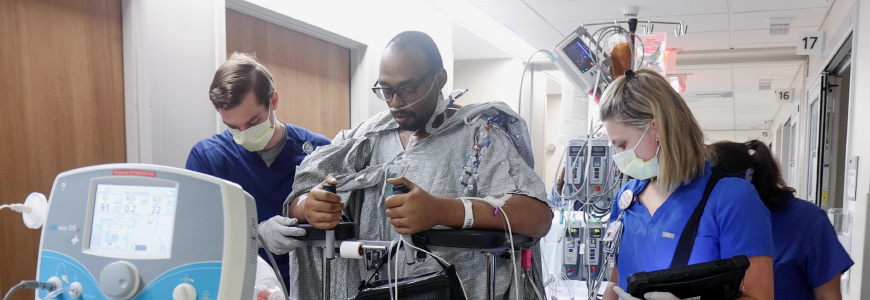Duke recently became only the second institution in the world to implant a BiVACOR Total Artificial Heart (TAH) (BiVACOR Inc, Huntington Beach, CA) as part of a clinical trial testing the device’s safety and performance for FDA approval. When a 34-year-old man presented with end-stage biventricular heart failure, his cardiologists were able to stabilize him but were left with few options to improve his condition. They referred him to Duke, where he became the second person to receive the TAH, which served as a bridge to transplant, in early August.
“While there are many ways to bridge patients with end-stage heart failure as they await heart transplant, all conventional strategies were unsuccessful for our patient, who had dysfunction of both the right and left side of the heart,” said Duke heart transplant surgeon Carmelo A. Milano, MD, chief of the Division of Cardiothoracic Surgery. “The BiVACOR TAH effectively replaced his entire heart and restored normal circulation. He was able to be successfully transplanted 10 days later.”
A lifesaving bridge
The TAH increases access to transplant for patients with severe need awaiting transplant, as with this patient. His condition deteriorated quickly, requiring a temporary ventricular assist device (VAD). However, the VAD failed to provide sufficient circulation support. Physicians then turned to the TAH to manage the patient’s condition until a suitable donor heart could be found.
The device takes the place of the heart muscle, circulating the blood while the patient awaits transfer. It is an option for eligible patients with severe biventricular heart failure or univentricular heart failure in which left VAD (LVAD) support is not indicated. In the current trial, recipients remain in the hospital until a heart can be transplanted.
“Many end-stage heart disease patients are actually too sick to qualify for heart transplants,” said heart surgeon Jacob N. Schroder, MD, surgical director of Advanced Heart Failure at Duke. “Current technologies are effective for some patients but still leave others without options. Having another way to bridge a path to transplant would fill a tremendous void and truly be a lifesaver.”
To refer a patient, call Duke Heart Center at 919-681-5816 or log in to Duke MedLink.
Access to cutting-edge clinical trials
Although the patient had received excellent care in his community, his physicians recognized that he needed the additional support and resources, including access to clinical trials available at Duke.
“We can offer our patients VADs, ECMO, and other technologies, but the ability to offer our patients the very highest level of care, such as heart and dual-organ transplant, as well as access to advanced devices such as the BiVACOR TAH — that does not happen unless you're aligned with a partner like Duke Health,” said Daniel R. Bensimhon, MD, part of the community care team at Cone Health in Greensboro, NC, who referred the patient to Duke. “It allows us to get our patients super high-level therapies fairly close to home that they would not have access to otherwise.”
The patient received the TAH just a few weeks after the first BiVACOR procedure in Texas. Duke is part of the larger study to continue furthering the science and technology of heart transplantation. In 2021, Duke was the first in the world to successfully implant a different model of TAH with biological valves and an external power supply. The newer BiVACOR TAH uses a simpler mechanism without valves. A motor drives a rotor to supply blood to both the heart and lungs using the same magnetic levitation technology which was proven effective in VADs through Duke research.
“The Duke heart transplant team has been a world leader in pioneering new technologies that make heart transplantation accessible to more patients,” said Adam D. DeVore, MD, MHS, medical director of the Duke Heart Transplant program. “With a long waiting list for the limited numbers of donor hearts, it’s imperative that we continue to find innovative ways to maximize scarce resources.”
The Duke Heart Transplant Program:
- Performed more heart transplants in 2023 than any other center in the country according to the Organ Procurement and Transplantation Network (OPTN)
- Has implanted more than 1,500 LVADs since 1994 and more than 2,000 hearts since 1985
- Has an average waitlist time of 33 days, versus 91 days nationally
- Participates in clinical trials testing the newest procedures and technology for transplant
- Is a leading center for donation after cardiac death (DCD)
- Is approved by UNOS to accept donor hearts with hepatitis C, hepatitis B, and HIV


